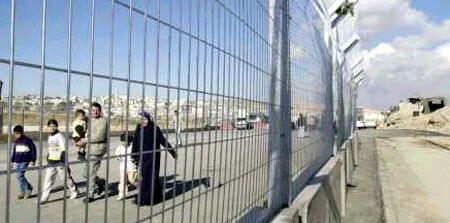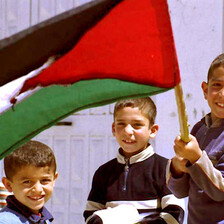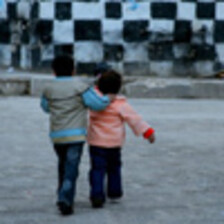When we stepped out of our appartment, we saw our neighbours and their children dressed in the new clothes that they could afford to buy to celebrate this year’s end of Ramadan. It’s the first day of Eid al-Fitr, the “feast of fast-breaking”, marking the end of the holy month, during which Muslims fast and reflect on self-discipline and compassion. Although the sun shines, the blue sky does not speak of the difficult times Palestinians have to endure.
The past few days I have tried to find a taxi-driver who was willing and had the courage to drive us up to Nablus, in the north of the occupied West Bank, to visit my family. My cousin managed on Thursday to reach Nablus from Ramallah. It took her six hours. Before the Israeli seige, such a trip would only take 40 minutes. My attempts to do the same on the first day of this feast had failed.
Instead, we paid a visit to other relatives who live in Ramallah. They had witnessed Israel’s latest incursion in Ramallah, tanks rolling down their streets. Israeli tanks entered the city from three directions, taking up position on a muddy field about 300 feet from al-Mutaqa’, the Palestinian Authority’s headquarters. They saw Israeli soldiers lay dynamite charges at the base of a 90-foot radio and television tower, which had dominated the Ramallah skyline. Two huge blasts and the tower fell, as if in slow motion, knocking Voice of Palestine off the air. Local FM stations worked to pick up the signal and rebroadcast it, but at a greatly reduced range.

Before reaching Ramallah we waited in line with commuters with both the orange West Bank and the green Jerusalem identity cards at the Kalandia checkpoint, a complicated entanglement of cars and concrete blocks.
Although there are five soldiers standing on the main street, which recently has seen the addition of iron gates and fences, underlining the reality of apartheid here on the ground, only one Israeli soldier was checking the ‘passbooks’.
Enduring waits of two or three hours, many motorists give up, park and walk to taxis waiting on either end. Kalandia is a huge bottleneck on the main West Bank thoroughfare linking Jerusalem and the town of Ramallah. Fortunately, it did not rain, but in other circumstances it is heartbreaking to watch women carrying their babies, old men, who barely can walk, standing in line and still keeping calm.
Before and during the weekend, Israel’s occupation forces killed thirty Palestinians, including thirteen during incursions that began on the last Friday of Ramadan. Israel’s F-16 warplanes and Apache helicopters, both delivered by the United States, attacked offices of the Palestinian Authority and Israeli tanks advanced in Ramallah within 100 meters of the Authority’s headquarters in the town.
Because our taxi-driver in Ramallah did not understand the address I gave him we passed the home of my family in the Balou’ area in the direction of the Israeli military base Beit El. We noticed all the buildings that have been taken over by Israeli soldiers. Sandbags, stacked in the open windows hinted at the military ‘purpose’ of these buildings. Between the trees we saw Israeli tanks there to enforce the siege on the town.

Screenshot Palestine TV
Visiting friends for Eid al-Fitr that evening in Shufat, a Palestinian neighborhood of East Jerusalem, I got the feeling that few were impressed by the speech delivered by the Palestinian President in which he demanded an end to armed attacks, suicide bombings and in which he pledged to arrest those who are planning to carry out such attacks. Discussion took place on Arafat’s “candy”, as one called it, for the people, elections, “when the time is ripe”. On the one hand, the Palestinian leader reiterated that there is only one authority and that everyone has to obey that authority, claiming national unity.
On the other hand, he gave the impression that he was leading a democratic institution. If there would be a real genuine call for democracy, people wondered, why there haven’t been local elections ever since the creation of the Palestinian Authority?
Someone else ridiculed America’s latest veto of a United Nations Security Council resolution on the Middle East. It was the 74th veto of a resolution by the United States. Other vetoes included resolutions condemning apartheid in South Africa and CIA activities in Latin America. The U.S. defended its veto by saying that the resolution, which called for international observers, looked to “isolate politically one of the parties in the conflict”. The resolution condemned “all acts of terror, in particular those targeting civilians”.
Palestinians don’t understand America’s war on terrorism. For them, this veto only meant a green light for more bloodshed. “If there is anything called incitement, then it is this position”, said Khaled, who owns a store in the neighborhood. “Why does the United States try to desperately cover-up its pro-Israel position, while for us it’s so obvious?” In late March, the US also used its Security Council veto to nix a text it deemed too critical of Israel.
The next day, three Palestinians, including a 12-year old boy, were killed by Israel’s occupation forces.





